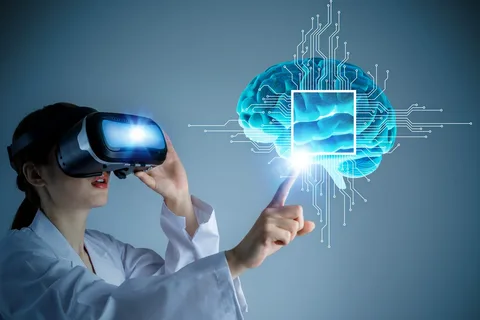Introduction
In recent years, the intersection of artificial intelligence and mental health has given rise to innovative solutions, notably in the form of chatbots. This article delves into the transformative role of AI-driven chatbots in therapy, exploring their benefits, challenges, and the evolving landscape of mental health support.
The Role of Chatbots in Mental Health
Chatbot technology has revolutionized the accessibility of mental health support. Unlike traditional therapy, chatbots are available 24/7, offering immediate assistance to individuals in need. The affordability factor makes them a viable option for a broader demographic, breaking down barriers to mental health care. Moreover, the confidential nature of interacting with a chatbot can encourage individuals to seek help without fear of judgment.
Benefits of AI-driven Therapy
The advantages of AI-driven therapy extend beyond accessibility. The personalization of therapy sessions based on individual needs and preferences enhances the overall user experience. Additionally, AI helps destigmatize mental health by providing a discreet and private platform for seeking help. Real-time monitoring and feedback contribute to more effective interventions.
Challenges and Concerns
While the potential benefits are significant, ethical considerations loom large. The lack of human touch in AI-driven therapy raises concerns about empathy and emotional understanding. Reliability and accuracy of AI algorithms also come into question, emphasizing the need for stringent standards and continuous improvement.
Success Stories
Numerous success stories highlight the positive impact of AI in mental health. From providing immediate support during crises to fostering ongoing therapeutic relationships, chatbots have become indispensable for many users. Testimonials underscore the effectiveness and convenience of AI-driven interventions.
Integrating AI with Traditional Therapy
Rather than replacing human therapists, AI is positioned to augment their capabilities. The synergy between AI and traditional therapy opens avenues for more comprehensive and personalized mental health care. Exploring this collaborative approach ensures that the human touch remains an integral part of the therapeutic process.
Criticisms and Debates
Despite the advancements, skepticism surrounds the role of AI in mental health. Common misconceptions need addressing, and a transparent dialogue about the limitations and possibilities of AI is crucial for building trust among users.
The Future Landscape
As technology continues to advance, the future of AI in mental health looks promising. Emerging technologies, such as virtual reality and advanced machine learning algorithms, hint at even more sophisticated interventions. The article explores the potential developments that could shape the landscape of AI-assisted therapy in the coming years.
Ethical Considerations
The ethical use of AI in mental health is paramount. Balancing innovation with patient well-being requires establishing clear guidelines and ensuring responsible practices in the development and deployment of AI-driven interventions.
Regulatory Framework
To safeguard users, a robust regulatory framework is essential. The article examines the current regulations governing AI-assisted therapy and advocates for standardized guidelines to uphold ethical standards and protect user interests.
User Experience and Interface
User-friendly interfaces play a pivotal role in the effectiveness of AI-driven mental health apps. Design considerations that enhance user engagement and promote a positive experience are explored, highlighting the importance of thoughtful interface design in the success of these applications.
The Human Touch
While AI offers significant advantages, the irreplaceable role of human therapists cannot be overlooked. The article emphasizes the complementary nature of AI and human interaction in ensuring a holistic and empathetic approach to mental health care.
AI-driven Mental Health Apps
A survey of popular AI-driven mental health apps provides insights into their features and functionalities. Understanding how these apps leverage AI to deliver effective interventions gives readers a practical perspective on the available options.
Case Studies
In-depth case studies analyze successful AI-based mental health interventions. By examining specific cases, readers gain a deeper understanding of the real-world impact of AI in diverse mental health scenarios.
Conclusion
In conclusion, the integration of AI in mental health, particularly through chatbots, marks a significant stride in broadening access to support. The evolving landscape holds promise, but ethical considerations, regulatory frameworks, and a focus on user experience are crucial for ensuring the responsible and effective use of AI in mental health care.
FAQs
- Can chatbots replace human therapists entirely?
While chatbots offer valuable support, they are designed to complement human therapists, not replace them. The human touch remains essential in mental health care.
- How secure is the information shared with AI-driven therapy apps?
Privacy and confidentiality are prioritized in AI-driven therapy apps, adhering to stringent security measures to protect user information.
- Are AI-driven mental health interventions effective in all cases?
The effectiveness of AI-driven interventions varies, and success depends on factors such as individual needs, the severity of the condition, and the quality of the AI algorithm.
- What ethical considerations are crucial in AI-assisted therapy?
Ensuring user consent, addressing bias in algorithms, and maintaining transparency in data usage are key ethical considerations in AI-assisted therapy.
- How can users navigate the potential pitfalls of relying on AI for mental health support?
Users should approach AI-driven mental health support as a supplementary tool, staying informed about its limitations and seeking professional assistance when needed.




